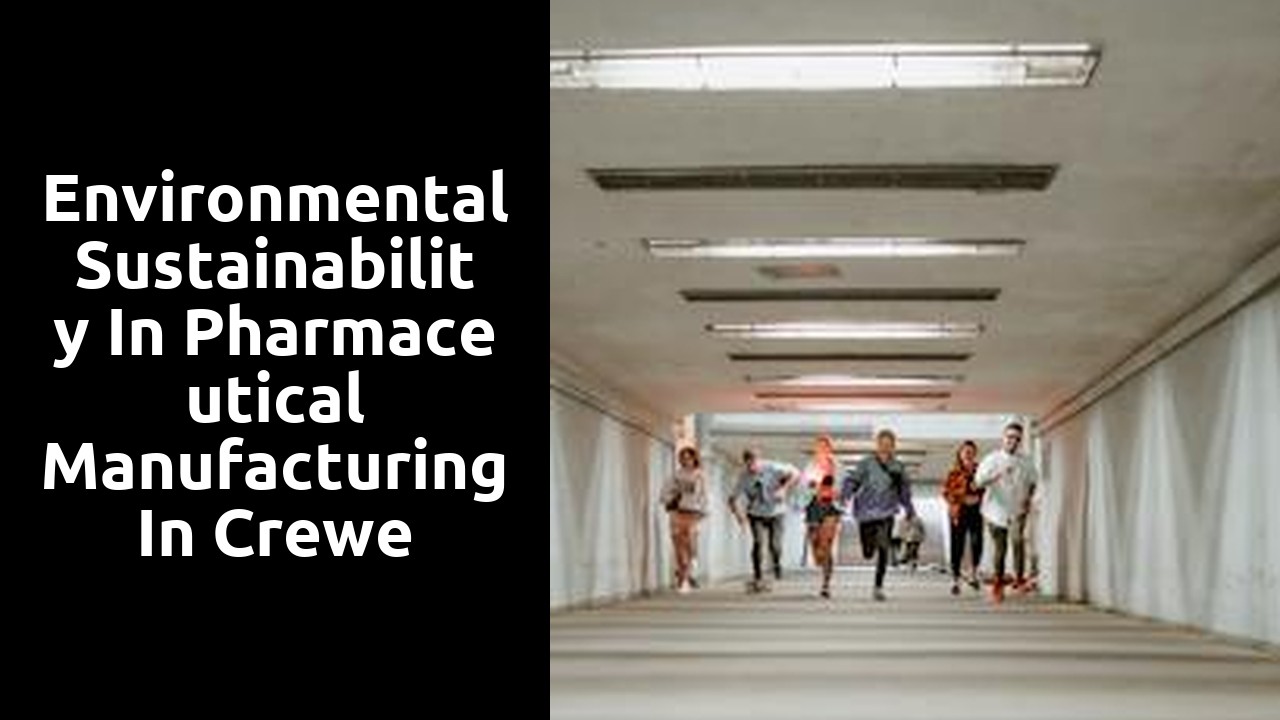Environmental Sustainability in Pharmaceutical Manufacturing in Crewe

The Role of Pharmaceutical Manufacturing in Preserving our Environment
Pharmaceutical manufacturing plays a crucial role in preserving our environment by adopting sustainable practices. With the growing concern of climate change and the need to reduce carbon emissions, the pharmaceutical industry has recognized its responsibility in minimizing its environmental impact. Companies are now focusing on implementing eco-friendly strategies throughout the manufacturing process to reduce waste, conserve resources, and promote sustainability.
One of the key ways pharmaceutical manufacturing contributes to environmental preservation is through the reduction of waste. Companies are implementing measures to minimize the generation of hazardous and non-hazardous waste by optimizing production processes and improving efficiency. This includes the proper disposal of waste materials and the recycling or reusing of by-products whenever possible. By adopting waste reduction practices, pharmaceutical manufacturers are not only reducing their impact on the environment but also saving resources and cutting costs.
Innovations Driving Sustainability in the Pharmaceutical Industry
In recent years, the pharmaceutical industry has been increasingly focused on driving sustainability through innovative practices. This shift towards sustainable manufacturing is driven by the growing recognition of the environmental impacts of pharmaceutical production and the desire to mitigate these effects.
One key area of innovation in sustainable pharmaceutical manufacturing is the development of green chemistry techniques. Green chemistry involves the design and production of chemical reactions with a minimal environmental impact. By using renewable resources, reducing chemical waste, and minimizing energy consumption, pharmaceutical manufacturers can significantly decrease their ecological footprint. These innovations in green chemistry not only contribute to environmental sustainability but also improve the overall efficiency and cost-effectiveness of pharmaceutical production.
Exploring the Environmental Impacts of Pharmaceutical Manufacturing
Exploring the Environmental Impacts of Pharmaceutical Manufacturing
Pharmaceutical manufacturing is an essential industry that plays a crucial role in preserving our health and well-being. However, it is important to acknowledge that this industry also has environmental impacts that need to be closely examined. One of the main concerns is the generation of pharmaceutical waste and its potential to contaminate the environment.
During the production process, pharmaceutical manufacturing can lead to the generation of various types of waste, including chemicals, solvents, and packaging materials. Improper disposal of these waste products can result in the release of harmful substances into the environment, posing a significant risk to ecosystems and human health. It is imperative for pharmaceutical manufacturers to adopt sustainable practices that address this issue and minimize the impacts on the environment. This entails implementing proper waste management strategies, such as recycling, incineration, or other environmentally friendly methods, to reduce the ecological footprint of pharmaceutical manufacturing.
Sustainable Practices: Reducing Waste in Pharmaceutical Production
Reducing waste in pharmaceutical production is crucial in order to promote sustainability and minimize the environmental impacts of the industry. Pharmaceutical manufacturing generates a significant amount of waste, including excess materials, byproducts, and packaging waste. These waste products can pose a threat to the environment if not properly managed.
To address this issue, pharmaceutical companies have implemented various sustainable practices to reduce waste. One approach is through the implementation of green manufacturing processes, which focus on optimizing the use of raw materials and minimizing waste generation. This includes adopting lean manufacturing principles, such as just-in-time production and waste segregation, to ensure that only the necessary materials are used and waste is minimized. Additionally, recycling and reusing packaging materials can also significantly reduce waste and promote a circular economy within the industry. By actively implementing these sustainable practices, pharmaceutical companies can not only reduce their environmental footprint but also contribute to the well-being of the communities they operate in.
Energy Efficiency: A Key Focus in Sustainable Pharmaceutical Manufacturing
Energy efficiency is a key area of focus in sustainable pharmaceutical manufacturing. With the growing concern for climate change and the need to reduce carbon emissions, pharmaceutical companies in Crewe are actively seeking ways to decrease their energy consumption. By implementing energy-efficient practices and technologies, these companies not only reduce their environmental impact but also cut costs and improve their overall sustainability.
One of the ways pharmaceutical manufacturers are achieving energy efficiency is through the use of advanced energy management systems. These systems provide real-time monitoring and control of energy usage, allowing companies to identify and address areas of high energy consumption. By optimizing energy usage in production processes, such as heating, ventilation, and air conditioning systems, pharmaceutical manufacturers can minimize their energy waste and operate more sustainably. Additionally, the use of energy-efficient lighting, machinery, and equipment further contribute to reducing energy consumption and advancing environmental sustainability in pharmaceutical manufacturing.
The Importance of Responsible Sourcing in Pharmaceutical Manufacturing
The importance of responsible sourcing in pharmaceutical manufacturing cannot be overstated. With increasing concern regarding the environmental and social impacts of the industry, it is crucial for pharmaceutical companies to prioritize sustainable and ethical sourcing practices. Responsible sourcing involves ensuring that raw materials used in the production of medicines are obtained in a manner that promotes biodiversity conservation, protects human rights, and minimizes negative environmental impacts.
Responsible sourcing not only benefits the environment, but also plays a significant role in safeguarding human health. By sourcing raw materials from reputable suppliers who adhere to stringent environmental and social standards, pharmaceutical companies can ensure that the products they manufacture are safe and free from harmful contaminants. Moreover, responsible sourcing practices can contribute to the preservation of ecosystems and biodiversity, which are essential for the long-term sustainability of our planet. As consumers become more conscious of the environmental and ethical aspects of the products they purchase, pharmaceutical companies must embrace responsible sourcing as a fundamental component of their business strategy.
Related Links
Future Outlook for Pharmaceutical Manufacturing Businesses in CreweJob Market and Employment Opportunities in Pharmaceutical Manufacturing in Crewe
Supply Chain Management in Pharmaceutical Manufacturing in Crewe
Quality Control and Assurance in Pharmaceutical Manufacturing Businesses in Crewe